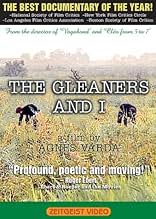To glean is to see something beautiful or useful in something that is conventionally useless, pointless or ugly, and to make that thing even more beautiful or useful. One can consume the stuff they glean, or they could recycle it into an art form, creating a whole new purpose for the object(s). Gleaning also applies to our basic ability for survival. In the worst times of our lives, whether it's the death of a friend or facing poverty or illness, there is a way of seeing things positively that helps us survive. Thus, faith and hope are gleaned in the face of disparity. Scientists glean facts and turn them into theory. We glean possibilities every time we use our imaginations. We glean memories when we write (James Joyce was probably the world's greatest literary gleaner). And psychiatrists pay attention to what others don't notice by gleaning beneath the stubborn surface of our egos. This film blew me away in how it depicted how much waste our society makes, and the myriad of ways in which those who glean what we discard benefit society. But the film is even more than a fascinating documentary and social statement. As one can see from the concepts listed above, it's also a celebration of seeing our world and ourselves as a "cluster of possibilities." There are many theories that we are all in essence stardust developed from fragments of 'the big bang' and quintessentially, this film is about "gleaners of stardust." It pertains to those who metaphorically glean the hidden mysteries and possibilities of our world (i.e. the gleaners of dreams and ideas). Come to think of it, film lovers and the best filmmakers are in fact, gleaners by that very definition. Agnes Varda has proved that she is one of the greatest gleaners of all time.






















